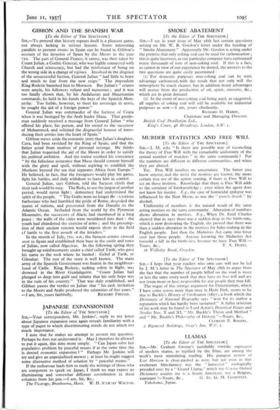GIBBON AND THE SPANISH WAR
[To the Editor of THE SrEcrKroa.]
&Ili—To pretend that history repeats itself is a pleasant game,
not always lacking in serious lessons. Some interesting parallels to present events in Spain can be found in Gibbon's account of the invasion of Spain by the Moors in the year 710. The part of General Franco, it seems, was then taken by Count Julian, a Gothic General, who was highly connected with Church and aristocracy, but had the misfortune of being on the wrong side in a change of regimes. Involved in the disgrace of the unsuccessful faction, General Julian "had little to hope and much to fear from the new reign." The imprudent King Roderic banished him to Morocco. But Julian's "estates were ample, his followers valiant and numerous ; and it was too fatally shown that, by his Andalusian and Mauritanian commands, he held in his hands the keys of the Spanish Mon- archy. Too feeble, however, to meet his sovereign in arms, he sought the aid of a foreign power."
General Julian was commander of the fortress of Ceuta when it was besieged by the Arab leader Musa. That gentle- man suddenly received a message from General Julian "who offered his place, his person, and his sword to the successor of Mohammed, and solicited the disgraceful honour of intro- ducing their armies into the heart of Spain."
Gibbon waves aside the romantic story that Julian's daughter, Cava, had been ravished by the King of Spain, and that the father acted from motives of personal revenge. He thinks that Julian requested the aid of the Moors in order to satisfy his political ambition. And the traitor soothed his conscience by the fallacious assurance that Musa should content himself with the glory and spoil, without aspiring to establish the Moslems beyond the sea that separates Africa from Europe." He believed, in fact, that the foreigners would play his game, fight his battles, and duly withdraw to leave him in control.
General Julian, says Gibbon, told the Saracen chiefs that their task would be easy. The Reds, to use the jargon of another period, would never fight ; democracy had undermined the spirit of the people. "The Goths were no longer the victorious barbarians who had humbled the pride of Rome, despoiled the queen of nations, and penetrated from the Danube to the Atlantic Ocean. Secluded from the world by the Pyrenean Mountains, the successors of Alaric had slumbered in a long peace : the walls of the cities were mouldered into dust : the youth had abandoned the exercise of arms ; and the presump- tion of their ancient renown would expose them in the field cf battle to the first assault of the invaders."
In the month of July, 710, A.D., the Saracen armies crossed
over to Spain and established their base in the castle and town of Julian, now called Algeciras. In the following spring they brought up reinforcements under a chief called Tank, who gave his name to the rock where he landed : Gebel at Tank, or Gibraltar. The rest of the story is well known. The main army of the Spanish Government was beaten in the neighbour- hood of Cadiz. King Roderic, seeking safety in flight, was drowned in the River Guadalquivir. "Count Julian had plunged so deep into guilt and infamy that his only hope was in the ruin of his country." That was duly established, and Gibbon passes the verdict on Julian that "his rash invitation to the Moors and Arabs produced the calamities of 800 years."
























































 Previous page
Previous page